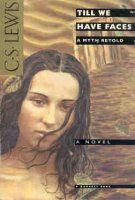 Till We Have Faces: A Myth Retold by C. S. Lewis (Harcourt Brace, 1956)
Till We Have Faces: A Myth Retold by C. S. Lewis (Harcourt Brace, 1956)
Of his re-telling of the Cupid and Psyche myth, C. S. Lewis said, "That book, which I consider far and away the best I have written, has been my one big failure both with the critics and with the public." The first time I read Till We Have Faces, I will admit, my sympathies were with those who did not appreciate it.
My ignorance of mythological history was a problem of course. Cupid I knew, but that was about it; how much less could I have told anything about their story as written in Apuleius's Metamorphoses, which was Lewis's inspiration. More than that, however, this novel is written in a different style from Lewis's other works; it is much like George MacDonald's Phantastes and Lilith. Lewis considered those two books among MacDonalds's best writing. I did not care much for either on first reading, but I love them now.
What he does best is fantasy—fantasy that hovers between the allegorical and the mythopoeic. And this, in my opinion, he does better than any man. (From the preface to Lewis's George MacDonald: An Anthology.)
Till We Have Faces is just such a book, and Lewis crafted it very, very well. It's no wonder he was pleased with his efforts. My second reading found me loving it for what it is, instead of being frustrated that it is not at all like Lewis's other fiction. That this is not a genre everyone likes is evident from its initial reception, though Walter Hooper, in his mammoth compendium, C. S. Lewis: A Companion and Guide, reports that later years have been kinder.
The main charge against the novel when it first appeared was obscurity. "What is he trying to say?" However, in recent years there has been a serious re-assessment of the book, almost an about-face in criticism, and it is generally regarded, not only as Lewis's best book, but as a very great book.
I found Hooper's analysis to be helpful in understanding both the Cupid and Psyche myth and what Lewis made of it in Till We Have Faces. It's also useful to have read the Biblical Book of Job. However, I think I would have enjoyed it nearly as much this time around simply because of having been schooled in the style by George MacDonald. Some people—our daughter for one—were blessed to love the book on first reading, but if you aren't, you may find it worthwhile to give it a second chance.
One of my all-time favorites.
You and Janet were 'way ahead of me, Brenda!


